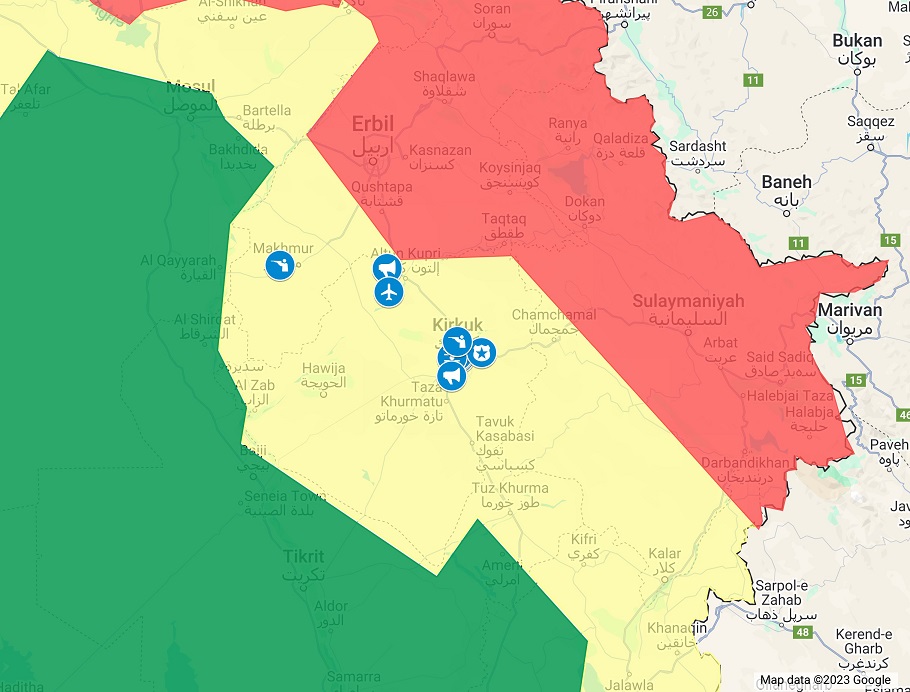1.2K
A biweekly brief of events and news occurred in the disputed territories.
Kirkuk
- A group of recently hired medical professionals from Kirkuk staged a protest against a decision made by the acting governor, Rakan al Jabouri, barring nearly 800 employees from commencing their federal employment. The reasoning behind this decision was cited as their exclusion from the 1957 census registry of Kirkuk. Predominantly comprising physicians and nurses, the protestors, primarily Kurds, spoke to Kurdistan24, accusing the acting governor of making unfounded allegations. Simultaneously, there has been an influx of hundreds of non-Kurdish individuals into Kirkuk, appointed to high-ranking government positions by Baghdad since October 16, 2017, as part of the Arabization policy.
- On November 26, after a six-year absence, the Kurdistan Democratic Party (KDP) officially resumed its political activities in Kirkuk. In a ceremony attended by hundreds of KDP supporters and senior party members, the headquarters were reopened. Notably, the party’s main headquarters had been seized by Iraqi forces on October 16, 2017. Following disagreements with the Iraqi military, the party successfully reclaimed its building but subsequently handed it over to the University of Kirkuk. The Iranian-backed militias and the Iraqi forces have occupied dozens of Kurdish-owned buildings since 2017, including 150 homes belonging to Kurds in the Masker Khaled neighborhood, where Turkmen militias refuse to return them.
- Unidentified gunmen fired multiple rounds into the office of Iraq’s Deputy Speaker, Shakhwan Abdullah, a senior member of the KDP. In a statement, Abdullah called for a thorough investigation and expressed “grave concerns” regarding the recurrent attacks on his office in Kirkuk.
- On November 24, the Kirkuk police reported the apprehension of several members of a notorious drug gang. According to the police statement, the arrests were made using intelligence information and through a “proactive operation” in collaboration with Sulimanyah’s anti-drug force. A substantial 51 kilograms of Crystal meth were seized in what was described as the “largest operation of the year.” Since October 16, 2017, Kirkuk has emerged as a primary route for drug traffickers, often associated with various armed factions supported by Iran.
- On November 20, the Iraqi government made its second change in a year to the commander of Kirkuk’s Joint Operations Command. The Ministry of Defense replaced General Jabar al Ta’ai with General Salih Harez, formerly the commander of the 8th and fifth divisions. Although the ministry did not provide a specific reason for the change, social media activists alleged that it might be connected to the events of September 4, during which Iraqi forces killed four Kurdish protesters.
- The Iraqi Supreme Court has postponed a verdict on a lawsuit filed by Arab and Turkmen parties, calling for the delay of the provincial elections to December 12. These parties argue that the review of voter registrations is incomplete, contrary to what officials of the Independent High Electoral Commission (IHEC) had previously announced. Kurdish parties, on the other hand, accuse the litigating parties of fearing potential losses in the upcoming elections, which mark the first occurrence since 2005.
- A U.S. airstrike hit a Harakat Hezbollah al-Nujaba (HHN) convoy near Kirkuk Governate’s Dibis subdistrict on Sunday, killing five militants and wounding three. U.S. Central Command (CENTCOM) said U.S. forces targeted the militia before it could conduct a “one-way” drone attack and acknowledged Iraqi security forces were notified of the strike. “CJTF-OIR forces responded in self-defense with an armed U.S. unmanned aerial system,” read a CENTCOM statement. HHN is an Iranian-backed militia that is suspected of various crimes in Iraq and has been designated as a terrorist organization by the U.S. State Department. HHN has also assisted the Iraqi government’s efforts to crack down on Kurdish political aspirations in Kirkuk since October 16, 2017.
- After three years of agreement with Erbil, the Iraqi government has opted to deploy a joint force comprising Peshmerga and Iraqi army units, organized into two divisions, across disputed territories. The decision, announced on November 26 by the Iraqi defense minister, entails enrolling individuals into these divisions and urging them to join training camps. This move follows years of challenges faced by Iraqi security forces in countering Da’esh terrorists, exacerbated by the removal of Peshmerga forces from the area, which resulted in a security vacuum. Notably, on December 1, Da’esh terrorists launched an attack on the Iraqi military near Aliesh village, situated across from Mount Makhmour. The clashes persisted for an hour. The following morning, Da’esh terrorists infiltrate Qop Tapa village in the Qaraj plains. Iraqi security forces utilized helicopter fighters to strike a residence used by the terrorists. One Iraqi soldier lost his life, and four others sustained injuries, while reports indicated five casualties among the terrorists. The area is considered the de facto headquarters of Da’esh terrorists, particularly since the withdrawal of Peshmerga forces from the region in 2017.
- On December 4, the Integrity Commission announced the arrest of three senior officials in the Kirkuk administration for “misappropriation of public funds during the execution of government projects in the Hawija district.” The statement revealed that the three government officials had falsified laboratory examination reports for a reconstruction project valued at nearly two billion Iraqi dinars.

